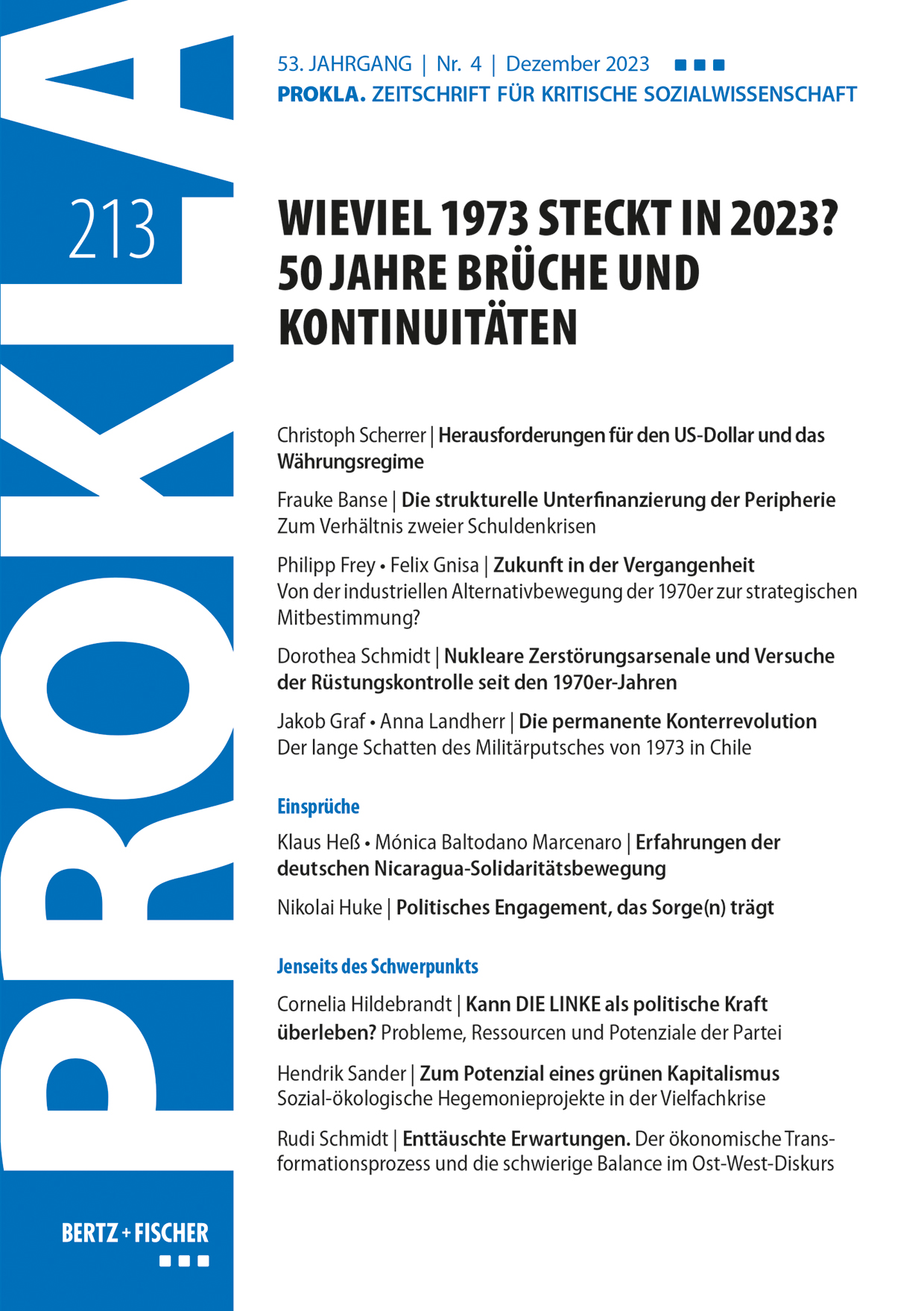Future in the Past
From the Industrial Alternative Movement of the 1970s to Strategic Co-Determination?
DOI:
https://doi.org/10.32387/prokla.v53i213.2085Keywords:
Conversion, Digitalization, Lucas Plan, Strategic Co-Determination, Socio-Ecological TransformationAbstract
Considering the challenges that companies are facing in the context of the socio-ecological transformation, the question arises how the strategic capacity of works councils can be strengthened. This article asks, what impulses the industrial alternative movement of the 1970s can deliver to extended co-determination in Germany. The discussion focuses on the potentials and limits of a greater politicization of workplace conflicts, an anticipatory engagement in strategic co-determination, and the usage of employee knowledge as a power resource.
Downloads
References
Bahnmüller, Reinhard u.a. (2023): Mitsprache bei der Digitalisierung? Beteiligung von Betriebsrat und Beschäftigten in digitalisierungsaktiven Betrieben. Düsseldorf.
Bosch, Gerhard u.a. (2020): Gestaltung von Industrie 4.0 durch gewerkschaftliche Betriebspolitik. In: Arbeit 29(1): 3-23. DOI: https://doi.org/10.1515/arbeit-2020-0002. DOI: https://doi.org/10.1515/arbeit-2020-0002
Candeias, Mario (2022): … das braucht unglaublich viel Arbeitskraft! Beschäftigungspotenzial alternativer Produktion als Basis der Mobilitätswende. In: Candeias, Mario / Krull, Stephan (Hg.): Spurwechsel. Studien zu Mobilitätsindustrien, Beschäftigungspotenzialen und alternativer Produktion. Hamburg: 385-403.
Cooley, Mike (Hg.) (1982): Produkte für das Leben statt Waffen für den Tod. Arbeitnehmerstrategien für eine andere Produktion. Das Beispiel Lucas Aerospace. Reinbek bei Hamburg.
– (2016): Architect or bee? The human price of technology. Nottingham.
Dörre, Klaus (2021): Gewerkschaften in der Großen Transformation – konservierende oder transformierende Interessenspolitik? In: Flore, Manfred u.a. (Hg.): Unterwegs zur neuen Mobilität. Perspektiven für Verkehr, Umwelt und Arbeit. München: 225-246.
Dullien, Sebastian u.a. (2021): Ein Transformationsfonds für Deutschland.
Fabrikkollektiv GKN u.a. (2022): Un piano per il futuro della fabbrica di Firenze. Dall’ex GKN alla Fabbrica socialmente integrata. Mailand.
Ferrari, Lukas / Kaiser, Julia (2023): Per Volksabstimmung zur Konversion? In: LuXemburg. URL: https://zeitschrift-luxemburg.de/artikel/konversion-gkn/, Zugriff 9.9.2023.
Haipeter, Thomas (2019): Interessenvertretung bei Volkswagen: neue Konturen einer strategischen Mitbestimmung. Hamburg.
Hirschel, Dierk (2020): Das Gift der Ungleichheit. Wie wir die Gesellschaft vor einem sozial und ökologisch zerstörerischen Kapitalismus schützen können. Bonn.
Hoose, Fabian u.a. (2019): Digitalisierung der Arbeit und Interessenvertretungen. In: Arbeit 28(4): 423-444. DOI: https://doi.org/10.1515/arbeit-2019-0025. DOI: https://doi.org/10.1515/arbeit-2019-0025
Kaiser, Julia (2023): Rückkehr der Konversionsbewegung? In: PROKLA 210 53(1): 35-53. DOI: https://doi.org/10.32387/prokla.v53i210.2031. DOI: https://doi.org/10.32387/prokla.v53i210.2031
Kemp, René u.a. (1998): Regime shifts to sustainability through processes of niche formation: The approach of strategic niche management. In: Technology Analysis & Strategic Management 10(2): 175-198. DOI: https://doi.org/10.1080/09537329808524310. DOI: https://doi.org/10.1080/09537329808524310
Köncke, Philipp (2022): Strukturwandel und Arbeitskämpfe in der deutschen Automobilindustrie. In: Candeias, Mario / Krull, Stephan (Hg.): Spurwechsel. Studien zu Mobilitätsindustrien, Beschäftigungspotenzialen und alternativer Produktion. Hamburg: 119-248.
Lehndorff, Steffen (2020): »New Deal« Means Being Prepared for Conflict. What We Can Learn from the New Deal of the 1930s. Hamburg.
Löw-Beer, Peter (Hg.) (1981): Industrie und Glück: Ein Alternativ-Plan von Lucas Aerospace. Berlin.
– (1982): Produktivität und Subjektivität. In: Cooley (1982): 152-180.
Matuschek, Ingo / Kleemann, Frank (2018): »Was man nicht kennt, kann man nicht regeln« Betriebsvereinbarungen als Instrument der arbeitspolitischen Regulierung von Industrie 4.0 und Digitalisierung. In: WSI-Mitteilungen 71(3): 227-234. DOI: https://doi.org/10.5771/0342-300X-2018-3-227. DOI: https://doi.org/10.5771/0342-300X-2018-3-227
Notz, Gisela (2018): Anders arbeiten – anders leben. Selbstverwaltete Betriebe als alternative Wirtschaftsmodelle gestern und heute. In: Alex Demirovi? (Hg.): Wirtschaftsdemokratie neu denken. Münster: 210-229.
Pausch, Markus (2018): Soziale Innovation zwischen Emanzipation und Anpassung. Momentum Quarterly 7(1): 42-52. DOI: https://doi.org/10.15203/momentumquarterly.vol7.no1.p42-52. DOI: https://doi.org/10.15203/momentumquarterly.vol7.no1.p42-52
Schmalz, Stefan / Dörre, Klaus (2014): Der Machtressourcenansatz: Ein Instrument zur Analyse gewerkschaftlichen Handlungsvermögens. In: The German Journal of Industrial Relations 21: 217-237.
Schot, Johan u.a. (1994): Strategies for shifting technological systems. In: Futures 26(10): 1060-1076. DOI: https://doi.org/10.1016/0016-3287(94)90073-6. DOI: https://doi.org/10.1016/0016-3287(94)90073-6
Smith, Adrian (2014): Socially Useful Production. STEPS Working Paper 58. Brighton.
Sohn-Rethel, Alfred (1981): Produktionslogik gegen Aneignungslogik. In: Löw-Beer (1981): 195-210.
Wainwright, Hilary / Elliott, David (2018): The Lucas plan. A new trade unionism in the making? Nottingham.






